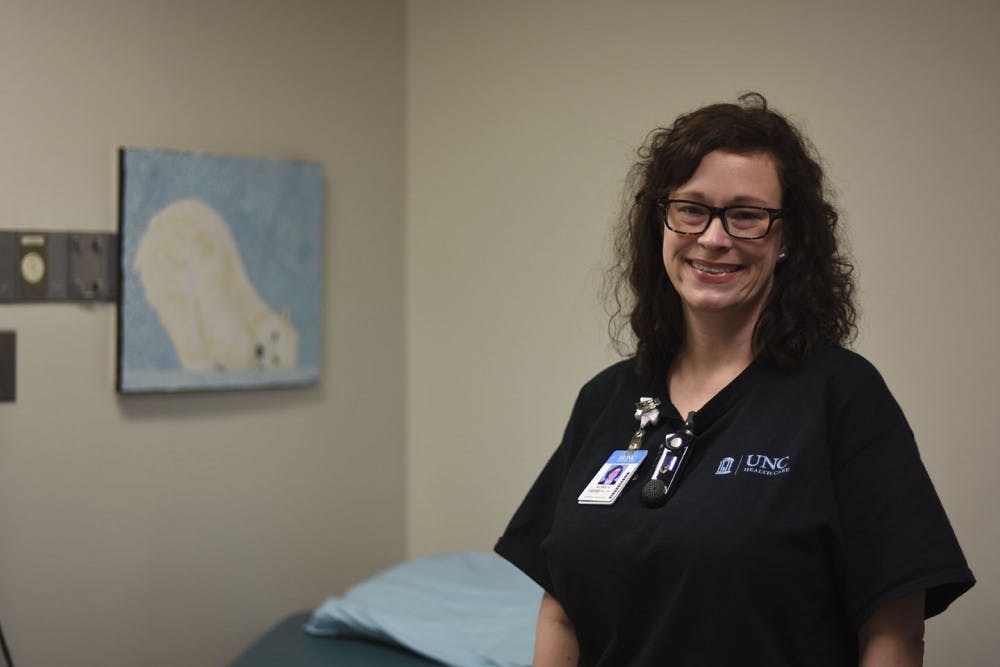“They understand trauma and they understand trauma responses, so when survivors are presenting and responding in many different ways, they understand where that’s coming from,” Wichman-Buescher said. “They let the survivor know exactly what is going to happen while they’re collecting the kit and they let them know they have a choice over all of it.”
Treating a campus
Women in college are three times more likely to be raped compared to women overall, according to the Rape, Abuse & Incest National Network.
Garrity said being a nurse on a college campus means she inevitably will see more college-aged patients, so it’s hard to say whether college students are truly the most susceptible population when it comes to sexual assault. But out of all college students, she said, first-years are the most vulnerable.
Flowers said Campus Health Services offers another layer of support for students who have experienced sexual assault, but anybody with significant trauma will be sent to UNC’s emergency department. She also said many assaults occur outside of the center’s regular business hours, which means most students will be treated by SANE nurses at UNC Hospitals.
Being a SANE nurse on a college campus may also mean going through Title IX investigations if a sexual assault survivor decides to file a report.
Flowers has been involved with two Title IX investigations, one out of state, and said she felt the process was much different than a typical criminal sexual assault investigation process because information was less accessible.
According to The Journal for Nurse Practitioners, there’s no national standard for SANE nurses’ involvement in the Title IX process. Each institution can use the nurses and their medical forensic exams on an ad hoc basis.
When Garrity was involved in a Title IX investigation, she said she was unable to learn the case’s outcome.
‘Vicarious trauma’
Charnessa Ridley, the sexual assault response team coordinator at North Carolina Coalition Against Sexual Assault, said in many states, SANE nurses work in rape crisis centers or standalone facilities, only dealing with sexual assault cases.
North Carolina SANE nurses like Garrity, on the other hand, work in hospitals as emergency department nurses as well as first responders in the case of a sexual assault.
To get the day's news and headlines in your inbox each morning, sign up for our email newsletters.
“I think that more SANE nurses should be available,” Ridley said. “For those people who are dedicating to doing it, we don’t want to contribute to their burnout because they have to work a regular shift and then come back in later to collect evidence for a case.”
Flowers said the pressure SANE nurses face trying to balance regular hospital shifts with being on call to take forensic exams has caused a high turnover rate within the profession.
Garrity said she doesn’t think people realize how emotionally taxing the job can be.
“You read articles in the newspaper and you see portrayals in movies, but when you are a part of it, it is more real and you just don’t realize how difficult it can be until you’re in it,” she said. “If you can just imagine one of the worst-case scenarios of an assault, we’ve seen it.”
Garrity said some of the worst cases she’s seen involve children, elderly and developmentally disabled patients who are abused by a caretaker.
“They rely on other people to get their needs met, and they’re so vulnerable,” she said. “It’s so hard when they come in and you see someone has taken advantage of that.”
Flowers said SANE nurses rely on each other for support. Every month, they have meetings to give each other advice, review things they can do differently in the future and, most importantly, give each other a space to express their feelings on particularly difficult cases.
“There is a kind of compassion, fatigue and vicarious trauma that you can begin to experience when you do this for a long period of time,” Flowers said. “Having someone you can pick up the phone and talk to, having a group that understands what you do is definitely advantageous.”
Garrity said having other nurses to lean on is beneficial, but her biggest encouragement on rough days comes from those she helps.
“I just remind myself that this patient needs me to give them the best care and options for care possible,” she said. “That motivates me to clear my mind and almost hyperfocus on the patient, and block out my feelings.”
“When I have had patients thank me for helping them with getting through this difficult situation, that makes everything worth it to me.”
@yayjennic
enterprise@dailytarheel.com




